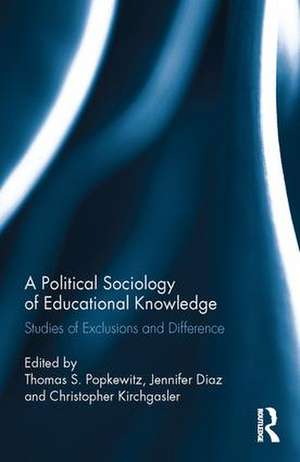A Political Sociology of Educational Knowledge: Studies of Exclusions and Difference
Editat de Thomas A. Popkewitz, Jennifer Diaz, Christopher Kirchgasleren Limba Engleză Hardback – 6 feb 2017
| Toate formatele și edițiile | Preț | Express |
|---|---|---|
| Paperback (1) | 392.67 lei 6-8 săpt. | |
| Taylor & Francis – 7 mai 2019 | 392.67 lei 6-8 săpt. | |
| Hardback (1) | 1219.65 lei 6-8 săpt. | |
| Taylor & Francis – 6 feb 2017 | 1219.65 lei 6-8 săpt. |
Preț: 1219.65 lei
Preț vechi: 1487.38 lei
-18% Nou
Puncte Express: 1829
Preț estimativ în valută:
233.37€ • 244.32$ • 193.11£
233.37€ • 244.32$ • 193.11£
Carte tipărită la comandă
Livrare economică 07-21 aprilie
Preluare comenzi: 021 569.72.76
Specificații
ISBN-13: 9781138694170
ISBN-10: 1138694177
Pagini: 282
Ilustrații: 2 black & white tables, 7 black & white line drawings
Dimensiuni: 152 x 229 x 15 mm
Greutate: 0.5 kg
Ediția:1
Editura: Taylor & Francis
Colecția Routledge
Locul publicării:Oxford, United Kingdom
ISBN-10: 1138694177
Pagini: 282
Ilustrații: 2 black & white tables, 7 black & white line drawings
Dimensiuni: 152 x 229 x 15 mm
Greutate: 0.5 kg
Ediția:1
Editura: Taylor & Francis
Colecția Routledge
Locul publicării:Oxford, United Kingdom
Public țintă
Postgraduate and UndergraduateCuprins
Introduction
1. Thomas S. Popkewitz, Jennie Diaz, and Christopher Kirchgasler. The Political and the Social of the Reason of Schooling and Educational Research
I. Schooling as Fabricating Human Kinds
2. Ezequiel Caride-Gomez. The Making of the Argentinean Citizen in the Birth of the Republic
3. Yasin Tunc. Puériculture (Education) and the Contours of the Republican Child Question and the Politics of Sexuality
4. Ji-Hye Kim. The Traveling of PISA: The Fabrication of the Korean Global Citizen and the Reason of Reforms.
5. Nancy Lesko and Alyssa Niccolini Feeling Progressive: Historicizing Affect in Education
II. The Alchemy: Making the subject
6. Kathryn L. Kirchgasler. Scientific Americans: Historicizing the Making of Difference in Early Twentieth Century U.S. Science Education
7. Catarina Silva Martins From scribbles to details: The Invention of Stages of Development in Drawing and the Government of the Child
8. Paola Valero. Mathematics for all, Economic Growth, and the Making of the Citizen-Worker
9. Franciele Ilha. The Alchemy of Brazilian Physical Education, the Regulating of the Body, and the Making of Kinds of People
III. The Double Gestures of Educational Reform: Inclusion as Exclusion
10. Jennifer Diaz. New Mathematics: A Tool for Living the Modern Life, Making the Mathematical Citizen, and the Problem of Disadvantage
11. Malin Ideland. The End of the World and a Promise of Happiness: Environmental Education within the Cultural Politics of Emotions
12. Jie Qi. The Double Gestures of Schooling: The Historical Permutations of the "Problem" Student
13. Weili Zhao. Untangling the Reasoning of China’s National Teacher Training Curriculum: Confucian Thesis, Modern Epistemology, and Difference
IV. Research as an "Actor" and the Political
14. Antti Saari. Technique of Freedom: Representing the School Class as a Social Order
15. Christopher Kirchgasler. The Perils of "Actionable Insights": Educational Research and the Making of Difference
16. Thomas S. Popkewitz. The Sociology of Education & the History of the Present: Designing Agency/Fabricating Difference
1. Thomas S. Popkewitz, Jennie Diaz, and Christopher Kirchgasler. The Political and the Social of the Reason of Schooling and Educational Research
I. Schooling as Fabricating Human Kinds
2. Ezequiel Caride-Gomez. The Making of the Argentinean Citizen in the Birth of the Republic
3. Yasin Tunc. Puériculture (Education) and the Contours of the Republican Child Question and the Politics of Sexuality
4. Ji-Hye Kim. The Traveling of PISA: The Fabrication of the Korean Global Citizen and the Reason of Reforms.
5. Nancy Lesko and Alyssa Niccolini Feeling Progressive: Historicizing Affect in Education
II. The Alchemy: Making the subject
6. Kathryn L. Kirchgasler. Scientific Americans: Historicizing the Making of Difference in Early Twentieth Century U.S. Science Education
7. Catarina Silva Martins From scribbles to details: The Invention of Stages of Development in Drawing and the Government of the Child
8. Paola Valero. Mathematics for all, Economic Growth, and the Making of the Citizen-Worker
9. Franciele Ilha. The Alchemy of Brazilian Physical Education, the Regulating of the Body, and the Making of Kinds of People
III. The Double Gestures of Educational Reform: Inclusion as Exclusion
10. Jennifer Diaz. New Mathematics: A Tool for Living the Modern Life, Making the Mathematical Citizen, and the Problem of Disadvantage
11. Malin Ideland. The End of the World and a Promise of Happiness: Environmental Education within the Cultural Politics of Emotions
12. Jie Qi. The Double Gestures of Schooling: The Historical Permutations of the "Problem" Student
13. Weili Zhao. Untangling the Reasoning of China’s National Teacher Training Curriculum: Confucian Thesis, Modern Epistemology, and Difference
IV. Research as an "Actor" and the Political
14. Antti Saari. Technique of Freedom: Representing the School Class as a Social Order
15. Christopher Kirchgasler. The Perils of "Actionable Insights": Educational Research and the Making of Difference
16. Thomas S. Popkewitz. The Sociology of Education & the History of the Present: Designing Agency/Fabricating Difference
Notă biografică
Thomas S. Popkewitz is Professor, School of Education, Department of Curriculum and Instruction, University of Wisconsin-Madison, USA.
Jennifer Diaz is Assistant Professor, Education Department, Augsburg College, USA.
Christopher Kirchgasler is Doctoral Candidate, School of Education, Department of Curriculum and Instruction, University of Wisconsin-Madison, USA.
Jennifer Diaz is Assistant Professor, Education Department, Augsburg College, USA.
Christopher Kirchgasler is Doctoral Candidate, School of Education, Department of Curriculum and Instruction, University of Wisconsin-Madison, USA.
Descriere
In a challenge to commonsense notions of power and the political, this book examines how schooling’s systems of reason embody historically generated rules and standards about what is talked about, thought, and acted on.
